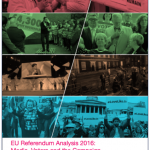We are delighted to announce the publication of U.S. Election Analysis 2020: Media, Voters and the Campaign
Featuring 91 contributions from over 115 leading US and international academics, this publication captures the immediate thoughts, reflections and early research insights on the 2020 U.S. presidential election from the cutting edge of media and politics research. It is a collaboration between BU academics, American University, and Kent State University, in partnership with the Political Studies Association, American Political Science Association and the International Political Science Association.
Published within eleven days of the election, these contributions are short and accessible. Authors provide authoritative analysis – including research findings and new theoretical insights – to bring readers original ways of understanding the campaign. Contributions also bring a rich range of disciplinary influences, from political science to cultural studies, journalism studies to geography.
Published within eleven days of the election, these contributions are short and accessible. Authors provide authoritative analysis – including research findings and new theoretical insights – to bring readers original ways of understanding the campaign. Contributions also bring a rich range of disciplinary influences, from political science to cultural studies, journalism studies to geography.
In 24 hours, the report website has already had over 5000 hits and has been featured by Nieman Lab.
As always, these reports are free to access.
The report can be found on https://www.electionanalysis.ws/us/ alongside our previous reports on UK and U.S. elections.
Direct pdf download is available at: http://j.mp/USElectionAnalysis2020_Jackson-et_al_v1 (please note, large file size!)
The table of contents is below.
1. Introduction
Daniel Jackson, Danielle Sarver Coombs, Filippo Trevisan, Darren Lilleker and Einar Thorsen
Daniel Jackson, Danielle Sarver Coombs, Filippo Trevisan, Darren Lilleker and Einar Thorsen
Policy and Political Context
2. The far-too-normal election
Dave Karpf
3. One pandemic, two Americas and a week-long election day
Ioana Coman
4. Political emotion and the global pandemic: factors at odds with a Trump presidency
Erik P. Bucy
5. The pandemic did not produce the predominant headwinds that changed the course of the country
Amanda Weinstein
6. Confessions of a vampire
Kirk Combe
7. COVID-19 and the 2020 election
Timothy Coombs
8. President Trump promised a vaccine by Election Day: that politicized vaccination intentions
Matthew Motta
9. The enduring impact of the Black Lives Matter movement on the 2020 elections
Gabriel B. Tait
10. Where do we go from here? The 2020 U.S. presidential election, immigration, and crisis
Jamie Winders
11. A nation divided on abortion?
Zoe Brigley Thompson
12. Ending the policy of erasure: transgender issues in 2020
Anne C. Osborne
13. U.S. presidential politics and planetary crisis in 2020
Reed Kurtz
14. Joe Biden and America’s role in the world
Jason Edwards
15. President Biden’s foreign policy: engagement, multilateralism, and cautious globalization
Klaus W. Larres
16. Presidential primary outcomes as evidence of levels of party unity
Judd Thornton
17. A movable force: the armed forces voting bloc
Amanda Weinstein
18. Guns and the 2020 elections
Robert Spitzer
19. Can Biden’s win stop the decline of the West and restore the role of the United States in the world?
Roman Gerodimos
Voters
20. A divided America guarantees the longevity of Trumpism
Panos Koliastasis and Darren Lilleker
21. Cartographic perspectives of the 2020 U.S. election
Ben Hennig
22. Vote Switching From 2016 to 2020
Diana Mutz and Sam Wolken
23. It’s the democracy, stupid
Petros Ioannidis and Elias Tsaousakis
24. Election in a time of distrust
John Rennie Short
25. Polarization before and after the 2020 election
Barry Richards
26. The political psychology of Trumpism
Richard Perloff
27. White evangelicals and white born again Christians in 2020
Ryan Claassen
28. Angry voters are (often) misinformed voters
Brian Weeks
29. A Black, Latinx, and Independent alliance: 2020
Omar Ali
30. Believing Black women
Lindsey Meeks
31. The sleeping giant awakens: Latinos in the 2020 election
Lisa Sanchez
32. Trump won the senior vote because they thought he was best on the economy – not immigration
Peter McLeod
33. Did German Americans again support Donald Trump?
Per Urlaub & David Huenlich
Ryan Claassen
28. Angry voters are (often) misinformed voters
Brian Weeks
29. A Black, Latinx, and Independent alliance: 2020
Omar Ali
30. Believing Black women
Lindsey Meeks
31. The sleeping giant awakens: Latinos in the 2020 election
Lisa Sanchez
32. Trump won the senior vote because they thought he was best on the economy – not immigration
Peter McLeod
33. Did German Americans again support Donald Trump?
Per Urlaub & David Huenlich
Candidates and the Campaign
34. The emotional politics of 2020: fear and loathing in the United States
Karin Wahl-Jorgensen
35. Character and image in the U.S. presidential election: a psychological perspective
Geoffrey Beattie
36. Branding and its limits
Ken Cosgrove
37. Celtic connections: reading the roots of Biden and Trump
Michael Higgins and Russ Eshleman
38. Kamala Harris, Bobby Jindal, and the construction of Indian American identity
Madhavi Reddi
39. Stratagems of hate: decoding Donald Trump’s denigrating rhetoric in the 2020 campaign
Rita Kirk and Stephanie Martin
40. Campaign finance and the 2020 U.S. election
Cayce Myers
41. The Emperor had no clothes, after all
Marc Hooghe
42. Trump’s tribal appeal: us vs. them
Stephen D. Reese
News and Journalism
43. When journalism’s relevance is also on the ballot
Seth C. Lewis, Matt Carlson and Sue Robinson
44. Beyond the horse race: voting process coverage in 2020
Kathleen Searles
45. YouTube as a space for news
Stephanie Edgerly
46. 2020 shows the need for institutional news media to make racial justice a core value of journalism
Nikki Usher
47. Newspaper endorsements, presidential fitness and democracy
Kenneth Campbell
48. Alternative to what?A faltering alternative-as-independent media
Scott A. Eldridge II
49. Collaboration, connections, and continuity in media innovation
Valerie Belair-Gagnon
50. Learning from the news in a time of highly polarized media
Marion Just and Ann Crigler
51. Partisan media ecosystems and polarization in the 2020 U.S. election
Michael Beam
52. What do news audiences think about ‘cutting away’ from news that could contain misinformation?
Richard Fletcher
53. The day the music died: turning off the cameras on President Trump
Sarah Oates
54. When worlds collide: contentious politics in a fragmented media regime
Michael X. Delli Carpini
55. Forecasting the future of election forecasting
Benjamin Toff
56. A new horse race begins: the scramble for a post-election narrative
Victor Pickard
Social media
57. Media and social media platforms finally begin to embrace their roles as democratic gatekeepers
Daniel Kreiss
58. Did social media make us more or less politically unequal in 2020?
Dan Lane and Nancy Molina-Rogers
59. Platform transparency in the fight against disinformation
Valerie Belair-Gagnon, Bente Kalsnas, Lucas Graves and Oscar Westlund
60. Why Trump’s determination to sow doubt about data undermines democracy
Alfred Hermida
61. A banner year for advertising and a look at differences across platforms
Markus Neumann, Jielu Yao, Spencer Dean and Erika Franklin Fowler
62. How Joe Biden conveyed empathy
Dorian Davis
63. The debates and the election conversation on Twitter
G.R. Boynton and Glenn W. Richardson
64. Did the economy, COVID-19, or Black Lives Matter to the Senate candidates in 2020?
Heather K. Evans and Rian F. Moore
65. Leadership through showmanship: Trump’s ability to coin nicknames for opponents on Twitter
Marco Morini
66. Election countdown: Instagram’s role in visualizing the 2020 campaign
Terri L. Towner and Caroline L. Munoz
67. Candidates did lackluster youth targeting on Instagram
John Parmelee
68. College students, political engagement and Snapchat in the 2020 general election
Laurie L. Rice and Kenneth W. Moffett
69. Advertising on Facebook: transparency, but not transparent enough
Jennifer Stromer-Galley, Patricia Rossini, Brian McKernan and Jeff Hemsley
70. Detecting emotions in Facebook political ads with computer vision
Michael Bossetta and Rasmus Schmøkel
Popular culture and public critique
71. On campaigns and political trash talk
Michael Butterworth
72. It’s all about my “team”: what we can learn about politics from sport
Natalie Brown-Devlin and Michael Devlin
73. Kelly Loeffler uses battle with the WNBA as springboard into Georgia Senate runoff
Guy Harrison
74. Made for the fight, WNBA players used their platform for anti-racism activism in 2020
Molly Yanity
75. Do National Basketball Association (NBA) teams really support Black Lives Matter?
Kwame Agyemang
76. The presidential debates: the media frames it all wrong
Mehnaaz Momen
77. Live… from California, it’s Kamala Harris
Mark Turner
78. Who needs anger management? Dismissing young engagement
Joanna Doona
79. Meme war is merely the continuation of politics by other means
Rodney Taveira
80. Satire failed to pack a punch in the 2020 election
Allaina Kilby
81. Election memes 2020, or, how to be funny when nothing is fun
Ryan M. Milner and Whitney Phillips
Democracy in crisis
82. Social media moderation of political talk
Shannon McGregor
83. The speed of technology vs. the speed of democracy
Ben Epstein
84. The future of election administration: how will states respond?
Jennifer L. Selin
85. How the movement to change voting procedures was derailed by the 2020 election results
Martin P. Wattenberg
86. From “clown” to “community”: the democratic potential of civility and incivility
Emily Sydnor
87. Searching for misinformation
David Silva
88. Relational listening as political listening in a polarized country
Kathryn Coduto
89. QAnon, the election and an evolving American conservativism
Harrison Lejeune
90. President Trump, disinformation, and the threat of extremist violence
Kurt Braddock
91. The disinformed election
Saif Shahin
92. Election 2020 and the further degradation of local journalism
Philip Napoli
We hope you enjoy reading it.
Dan, Danielle, Filippo, Darren and Einar
 BU academics publish UK election report within 10 days of vote
BU academics publish UK election report within 10 days of vote BU academics publish election analysis report within 10 days of the result
BU academics publish election analysis report within 10 days of the result US Election Analysis 2016: Media, Voters and the Campaign
US Election Analysis 2016: Media, Voters and the Campaign BU academics launch EU Referendum Analysis report within ten days of the vote
BU academics launch EU Referendum Analysis report within ten days of the vote










 REF Code of Practice consultation is open!
REF Code of Practice consultation is open! BU Leads AI-Driven Work Package in EU Horizon SUSHEAS Project
BU Leads AI-Driven Work Package in EU Horizon SUSHEAS Project Evidence Synthesis Centre open at Kathmandu University
Evidence Synthesis Centre open at Kathmandu University Expand Your Impact: Collaboration and Networking Workshops for Researchers
Expand Your Impact: Collaboration and Networking Workshops for Researchers ECR Funding Open Call: Research Culture & Community Grant – Apply now
ECR Funding Open Call: Research Culture & Community Grant – Apply now ECR Funding Open Call: Research Culture & Community Grant – Application Deadline Friday 12 December
ECR Funding Open Call: Research Culture & Community Grant – Application Deadline Friday 12 December MSCA Postdoctoral Fellowships 2025 Call
MSCA Postdoctoral Fellowships 2025 Call ERC Advanced Grant 2025 Webinar
ERC Advanced Grant 2025 Webinar Update on UKRO services
Update on UKRO services European research project exploring use of ‘virtual twins’ to better manage metabolic associated fatty liver disease
European research project exploring use of ‘virtual twins’ to better manage metabolic associated fatty liver disease